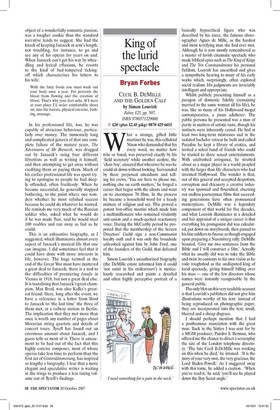King of the lurid spectacle
Bryan Forbes CECIL B. DEMILLE AND THE GOLDEN CALF by Simon Louvish Faber, £25, pp. 507, ISBN 9780571229000 © £20 (plus £2.45 p&p) 0870 429 6655 What a strange, gifted little martinet he was, this celluloid Nixon who demanded that his every word, no matter how trite or banal, was preserved exactly by his 'field secretary' while another acolyte, the 'chair boy', ensured that wherever he was he could sit down without looking. Surrounded by these perpetual attendants and telling his crews, 'You are here to please me, nothing else on earth matters,' he forged a career that began with the silents and went on to encompass 70 films. In the process he became a household word for a heady mixture of religion and sex. This proved a potent box-office martini which made him a multimillionaire who remained virulently anti-union and a much-quoted reactionary voice. During the McCarthy period he proposed that the membership of the Screen Directors' Guild sign a non-Communist loyalty oath and it was only the broadside unleashed against him by John Ford, one of the founders of the Guild, that defeated him Simon Louvish's unauthorised biography (the DeMille estate informed him it could 'not assist in his endeavours') is meticulously researched and paints a detailed and often highly perceptive portrait of a basically hypocritical figure who was described by his niece, the famous choreographer Agnes de Mille, as the hardest and most terrifying man she had ever met. Although he is now mostly remembered as a master of lavish cinematic spectacle who made biblical epics such as The King of Kings and The Ten Commandments his personal fiefdom, Louvish has unearthed and gives a sympathetic hearing to many of his early works which, surprisingly, often explored social realism. His judgments are invariably intelligent and appropriate.
Whilst publicly presenting himself as a paragon of domestic fidelity (remaining married to the same woman all his life), he was, like so many of his Hollywood mogul contemporaries, a pious adulterer. The public persona he presented was a man of purity in matters of artistic taste, though his instincts were inherently carnal. He had at least two long-term mistresses and in the isolated bachelor retreat he built and called Paradise he kept a library of erotica, and invited a select band of friends who could be trusted to share sexual entertainments. With unabashed arrogance, he strutted about as a major player in a world peopled with the larger than life characters who had invented Hollywood. The wonder is that, out of this general and accepted despotism, corruption and chicanery a creative industry was spawned and flourished, churning out endless journeyman films that succeeding generations have often pronounced masterpieces. DeMille was a legendary component of that world for five decades, and what Louvish illuminates in a detailed and fair appraisal of a unique career is that everything his protagonist did was calculated, put down on storyboards, then passed to his line soldiers to finesse as though engaged upon preparing a Nuremberg rally. DeMille boasted, 'Give me two sentences from the Bible and I will construct a film.' Actually what he usually did was to take the Bible and twist its contents to his own vision as he rode roughshod as the undisputed king of lurid spectacle, giving himself billing over his stars — one of the few directors whose names were instantly recognisable by the general public.
The only blot on this very readable account is that Louvish's publishers did not give him illustrations worthy of his text: instead of being reproduced on photographic paper, they are incorporated into the text, small, blurred and a cheap disgrace.
I should perhaps mention that I had a posthumous association with the great man. Back in the Sixties I was sent for by a MGM producer, Pandro S. Berman, who offered me the chance to direct a screenplay the size of the London telephone directory. 'The late Cecil B.DeMille was working on this when he died,' he intoned. 'It is the story of your very own, the very gracious, the Lord Baden-Powell.' As I staggered away with this tome, he added a caution. 'When you've read it,' he said, 'you'll see he played down the Boy Scout angle.'







































































 Previous page
Previous page